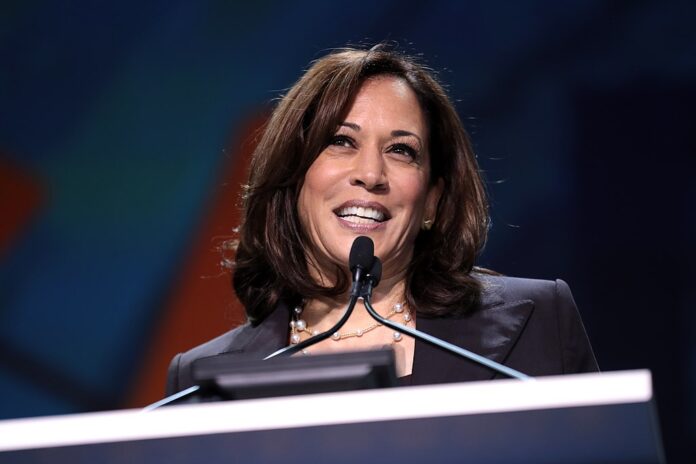In their first face-to-face confrontation, former president Donald Trump and Vice President Kamala Harris spar over immigration, the economy, and national unity, setting the stage for a crucial election season
In a high-stakes showdown, former President Donald Trump and Vice President Kamala Harris faced off in Philadelphia on Tuesday night for their first presidential debate of the 2024 election cycle. Moderated by ABC’s David Muir and Linsey Davis, the 90-minute debate saw the two candidates clash over a range of issues, including the economy, immigration, and national security.
The debate began with a cordial handshake between the two candidates as they took their places on stage. Trump, having won a virtual coin toss, chose to deliver the final closing statement, while Harris selected the right side of the stage for her position. The discussion quickly turned contentious as the candidates presented their differing visions for the country.
Harris kicked off the debate by discussing her economic agenda. She highlighted her plan to boost the child tax credit to $6,000 and provide tax deductions for small businesses. Harris emphasized her commitment to an “opportunity economy,” aiming to improve financial prospects for all Americans. She refrained from directly answering whether Americans are better off economically compared to four years ago, instead focusing on her administration’s positive goals.
Embed from Getty ImagesTrump countered by advocating for the imposition of substantial tariffs and criticized undocumented immigrants, claiming they are displacing American workers and increasing crime. He argued that his economic policies would be more beneficial, contrasting sharply with Harris’s proposals.
The debate took a dramatic turn as Harris criticized Trump for his handling of the economy and national security. She pointed out that Trump left the Biden-Harris administration with the worst unemployment levels since the Great Depression and called the January 6th Capitol attack the worst threat to American democracy since the Civil War. Harris aimed to draw a stark contrast between her vision for a united America and Trump’s divisive rhetoric.
Trump responded by dismissing Harris’s claims and distancing himself from Project 2025, a conservative policy outline linked to his previous administration. He insisted that he had no involvement with the plan and had not read it, despite its association with many former Trump administration officials.
The debate highlighted the polarized nature of the 2024 election, with both candidates making strong, sometimes contentious, statements. Trump’s emphasis on immigration and tariffs contrasted sharply with Harris’s focus on economic reforms and national unity. The debate set a combative tone for the upcoming election, underscoring the deep divisions within American politics.
Analysis:
Political Perspective:
The Trump-Harris debate underscored the polarization in American politics. Trump’s focus on tariffs and immigration reflected his populist approach, appealing to voters concerned about economic protectionism and national security. Harris’s emphasis on unity and economic opportunity aimed to address the concerns of voters seeking stability and inclusivity. The debate highlighted the candidates’ divergent strategies for addressing America’s challenges, setting the stage for a contentious election season.
Social Perspective:
The debate mirrored ongoing societal debates about immigration, economic inequality, and national unity. Trump’s rhetoric about immigrants and crime tapped into fears about security and job displacement, while Harris’s focus on economic reforms and unity addressed concerns about social justice and economic disparity. The candidates’ contrasting views reflect broader societal tensions and differing visions for America’s future.
Racial Perspective:
Trump’s comments about undocumented immigrants and crime have been criticized for perpetuating racial and ethnic stereotypes. His portrayal of immigrants as a threat resonates with some voters but raises concerns about reinforcing negative racial biases. Harris’s focus on economic opportunities and unity aims to counteract these divisive narratives and appeal to a more inclusive vision of America.
Gender Perspective:
Harris’s role as the first female vice president and her candidacy for the presidency highlights gender dynamics in the debate. Her focus on unity and economic opportunities underscores a broader commitment to addressing gender disparities and promoting equality. Trump’s aggressive rhetoric and dismissive attitude towards Harris can be seen as reflective of broader gender dynamics in political discourse, where female leaders often face heightened scrutiny and challenges.
Economic Perspective:
The debate’s economic discussion centred on contrasting visions for addressing financial challenges. Trump’s advocacy for tariffs and criticism of immigration were aimed at protecting American jobs and industries, while Harris’s proposals focused on expanding economic opportunities through tax reforms and support for small businesses. The debate showcased differing approaches to economic policy, reflecting broader debates about how best to stimulate growth and address inequality.
